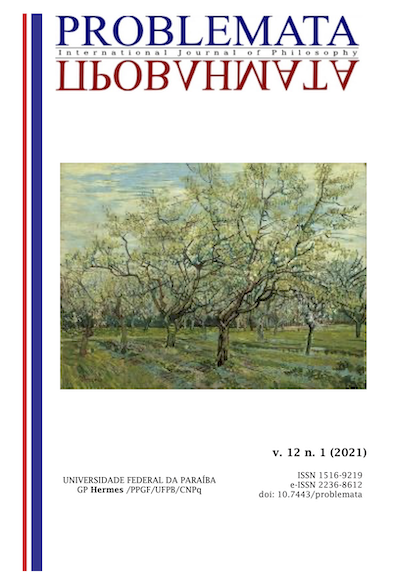THE FUTURE BETWEEN CATASTROPHE AND PROGRESS IN WALTER BENJAMIN
DOI:
https://doi.org/10.7443/problemata.v12i1.55777Keywords:
Future, Progress, Past, MarxismAbstract
In this article, we will make incursions into Walter Benjamin's more political texts, seeking to analyze the relationship between the past and the future and how the appreciation of the latter, from an Enlightenment inspiration, ended up resulting for Benjamin in an unstoppable myth of progress and infinite perfectibility human. We will show, as according to our author, this “progressive” idea ended up seducing everyone, from right to left, with “catastrophic” implications for the oppressed class. From an analysis of the "Angel of history" of the Theses, we will outline Benjamin's "unofficial Marxism" not only emphasizing his strong Jewish matrix, but also through his relationship with Asja Lacis and Bertold Brecht, his attack on social German democracy and its recourse to the utopian socialism of Auguste Blanqui.
Downloads
References
BENJAMIN, W. Angelus Novus. Torino: Einaudi, 1962.
______. Sul concetto di storia, Torino: Einaudi, 1997.
______. Diario moscovita, Torino: Einaudi, 1983.
BONOLA, G. «La porta di ogni istante», in L'ospite ingrato, Macerata: Quodlibet, 2013.
DESIDERI, F. Benjamin, Roma: Carocci editori, 2010.
LÖWY, M. Segnalatore d'incedio. Una lettura delle tesi sul concetto di storia di Walter Benjamin, Torino: Bollati Boringhieri, 2004.
ROSENZWEIG, F. La stella della redenzione. Milano: Vita e Pensiero, 2008.
SCHOLEM, G. Walter Benjamin. Storia di un'amicizia, Milano: Adelphi, 1992
______, G. Walter Benjamin e il suo angelo, Adelphi, Milano 2007.
WITTE, B. Walter Benjamin. Introduzione alla vita e alle opere, Lucarini: Roma 1991.
Downloads
Published
Issue
Section
License
Copyright (c) 2021 Deborah Spiga

This work is licensed under a Creative Commons Attribution 4.0 International License.
Authors who publish with this journal agree to the following terms:
- Authors retain copyright and grant the journal right of first publication with the work simultaneously licensed under a Creative Commons Attribution License that allows others to share the work with an acknowledgement of the work's authorship and initial publication in this journal.
- Authors are able to enter into separate, additional contractual arrangements for the non-exclusive distribution of the journal's published version of the work (e.g., post it to an institutional repository or publish it in a book), with an acknowledgement of its initial publication in this journal.
-
- Authors are permitted and encouraged to post their work online (e.g., in institutional repositories or on their website) prior to and during the submission process, as it can lead to productive exchanges, as well as earlier and greater citation of published work (See The Effect of Open Access).





